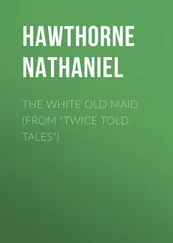Had I been as cold-hearted as I sometimes thought myself, nothing would have interested me more than to witness the play of passions that must thus have been evolved. But, in honest truth, I would really have gone far to save Priscilla, at least, from the catastrophe in which such a drama would be apt to terminate.
Priscilla had now grown to be a very pretty girl, and still kept budding and blossoming, and daily putting on some new charm, which you no sooner became sensible of than you thought it worth all that she had previously possessed. So unformed, vague, and without substance, as she had come to us, it seemed as if we could see Nature shaping out a woman before our very eyes, and yet had only a more reverential sense of the mystery of a woman’s soul and frame. Yesterday, her cheek was pale, to-day, it had a bloom. Priscilla’s smile, like a baby’s first one, was a wondrous novelty. Her imperfections and shortcomings affected me with a kind of playful pathos, which was as absolutely bewitching a sensation as ever I experienced. After she had been a month or two at Blithedale, her animal spirits waxed high, and kept her pretty constantly in a state of bubble and ferment, impelling her to far more bodily activity than she had yet strength to endure. She was very fond of playing with the other girls out of doors. There is hardly another sight in the world so pretty as that of a company of young girls, almost women grown, at play, and so giving themselves up to their airy impulse that their tiptoes barely touch the ground.
Girls are incomparably wilder and more effervescent than boys, more untamable and regardless of rule and limit, with an ever-shifting variety, breaking continually into new modes of fun, yet with a harmonious propriety through all. Their steps, their voices, appear free as the wind, but keep consonance with a strain of music inaudible to us. Young men and boys, on the other hand, play, according to recognized law, old, traditionary games, permitting no caprioles of fancy, but with scope enough for the outbreak of savage instincts. For, young or old, in play or in earnest, man is prone to be a brute.
Especially is it delightful to see a vigorous young girl run a race, with her head thrown back, her limbs moving more friskily than they need, and an air between that of a bird and a young colt. But Priscilla’s peculiar charm, in a foot-race, was the weakness and irregularity with which she ran. Growing up without exercise, except to her poor little fingers, she had never yet acquired the perfect use of her legs. Setting buoyantly forth, therefore, as if no rival less swift than Atalanta could compete with her, she ran falteringly, and often tumbled on the grass. Such an incident — though it seems too slight to think of — was a thing to laugh at, but which brought the water into one’s eyes, and lingered in the memory after far greater joys and sorrows were wept out of it, as antiquated trash. Priscilla’s life, as I beheld it, was full of trifles that affected me in just this way.
When she had come to be quite at home among us, I used to fancy that Priscilla played more pranks, and perpetrated more mischief, than any other girl in the Community. For example, I once heard Silas Foster, in a very gruff voice, threatening to rivet three horseshoes round Priscilla’s neck and chain her to a post, because she, with some other young people, had clambered upon a load of hay, and caused it to slide off the cart. How she made her peace I never knew; but very soon afterwards I saw old Silas, with his brawny hands round Priscilla’s waist, swinging her to and fro, and finally depositing her on one of the oxen, to take her first lessons in riding. She met with terrible mishaps in her efforts to milk a cow; she let the poultry into the garden; she generally spoilt whatever part of the dinner she took in charge; she broke crockery; she dropt our biggest water pitcher into the well; and — except with her needle, and those little wooden instruments for purse-making — was as unserviceable a member of society as any young lady in the land. There was no other sort of efficiency about her. Yet everybody was kind to Priscilla; everybody loved her and laughed at her to her face, and did not laugh behind her back; everybody would have given her half of his last crust, or the bigger share of his plum-cake. These were pretty certain indications that we were all conscious of a pleasant weakness in the girl, and considered her not quite able to look after her own interests or fight her battle with the world. And Hollingsworth — perhaps because he had been the means of introducing Priscilla to her new abode — appeared to recognize her as his own especial charge.
Her simple, careless, childish flow of spirits often made me sad. She seemed to me like a butterfly at play in a flickering bit of sunshine, and mistaking it for a broad and eternal summer. We sometimes hold mirth to a stricter accountability than sorrow; it must show good cause, or the echo of its laughter comes back drearily. Priscilla’s gayety, moreover, was of a nature that showed me how delicate an instrument she was, and what fragile harp-strings were her nerves. As they made sweet music at the airiest touch, it would require but a stronger one to burst them all asunder. Absurd as it might be, I tried to reason with her, and persuade her not to be so joyous, thinking that, if she would draw less lavishly upon her fund of happiness, it would last the longer. I remember doing so, one summer evening, when we tired laborers sat looking on, like Goldsmith’s old folks under the village thorn-tree, while the young people were at their sports.
“What is the use or sense of being so very gay?” I said to Priscilla, while she was taking breath, after a great frolic. “I love to see a sufficient cause for everything, and I can see none for this. Pray tell me, now, what kind of a world you imagine this to be, which you are so merry in.”
“I never think about it at all,” answered Priscilla, laughing. “But this I am sure of, that it is a world where everybody is kind to me, and where I love everybody. My heart keeps dancing within me, and all the foolish things which you see me do are only the motions of my heart. How can I be dismal, if my heart will not let me?”
“Have you nothing dismal to remember?” I suggested. “If not, then, indeed, you are very fortunate!”
“Ah!” said Priscilla slowly.
And then came that unintelligible gesture, when she seemed to be listening to a distant voice.
“For my part,” I continued, beneficently seeking to overshadow her with my own sombre humor, “my past life has been a tiresome one enough; yet I would rather look backward ten times than forward once. For, little as we know of our life to come, we may be very sure, for one thing, that the good we aim at will not be attained. People never do get just the good they seek. If it come at all, it is something else, which they never dreamed of, and did not particularly want. Then, again, we may rest certain that our friends of to-day will not be our friends of a few years hence; but, if we keep one of them, it will be at the expense of the others; and most probably we shall keep none. To be sure, there are more to be had; but who cares about making a new set of friends, even should they be better than those around us?”
“Not I!” said Priscilla. “I will live and die with these!”
“Well; but let the future go,” resumed I. “As for the present moment, if we could look into the hearts where we wish to be most valued, what should you expect to see? One’s own likeness, in the innermost, holiest niche? Ah! I don’t know! It may not be there at all. It may be a dusty image, thrust aside into a corner, and by and by to be flung out of doors, where any foot may trample upon it. If not to-day, then tomorrow! And so, Priscilla, I do not see much wisdom in being so very merry in this kind of a world.”
Читать дальше












